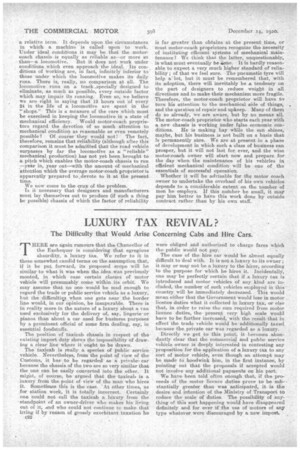LUXURY TAX REVIVAL?
Page 16

If you've noticed an error in this article please click here to report it so we can fix it.
The Difficulty that Would Arise Concerning Cabs and Hire Cars.
THERE axe again rumours that the Chancellor of the Exchequer is considering that egregious absurdity, a luxury tax. We refer to it in these somewhat candid terms on the assumption that, if it be put forward, its Proposed scope will be similar to what it was when the :idea was previously mooted, in which case certain cIaSses of motor vehicle will pres,umably come within its orbit. We may assume that no one would be mad enough to regard the trade or public service vehicle as a luxury, hut the difficultiu when one gets near the border
• line would, in our opinion, be insuperable. There is in reality more in the nature of a luxury about a van used exclusively for the delivery of, say, lingerie or pianos than about a car used for business. purposes by a prominent official of some firm dealing, say, in essential foodstuffs.
The position of taxicab chassis in respect of the existing import duty shows the impossibility Of draw ing a clear line where it ought to be drawn. .
The taxicab is really , a species of public service vehicle. Nevertheless, from the point of view of the Customs, it hass.to be regarded AZ a privates car because the chassis of the-two are so very similar that the one can be easily converted .into the other. It might, or course, be •argued that the taxicab is a luxury from the point of view of the man who hires it. Sometimes this is the case. At other times, as for station work, it is totally incorrect. Certainly one Could not call the taxicab a luxury from the -standpoint of an owner-driver who makes his living out of it, said who could not continue to make that living if by reason of grossly exorbitant taxation he
c22 were obliged and authorized to charge fares which the public would not. pay.
The case of the hire car would -be almost equally difficult to deal with. It is not a luxury to its owner;
it may or may not be a luxury to the. hirer, according to the purpose for which he hires it, IncidentallY, one may be perfectly certain that if a luxury tax is introduced and motor vehicles of any kind are in cluded, the number of such vehicles eraployed in this country, will be immediately decreased. Thia would mean either that the Government would lose in_ motor licence duties what it collected in luxury tax, or else that, in order to raise the sum required from motor licence duties, the present very high scale would have to be further increased, with the result that in effect the trade vehicle would be 'additionally taxed because the private car was regarded as &luxury. Directly we get to this point, it becomes abundantly clear that the commercial and public service
vehicle owner, is deeply interested in centesting any -proposition for the application of a luxury tax to any sort of motor vehicle, even though an attempt may
be Made to' hoodwink him, in the first instance, by pointing out that the proposals if accepted would not involve any additional payments on his part.
We have been told often enough that, if the proceeds of the motor licence duties prove to be substantially greater than was anticipated, it is the desire and intention of. the Ministry of Transport to reduce the scale of duties. Thepossibility of anything of this sort happening would have disappeared definitely and for ever if the use of motors of any type whatever were discouraged by a new impost.






























